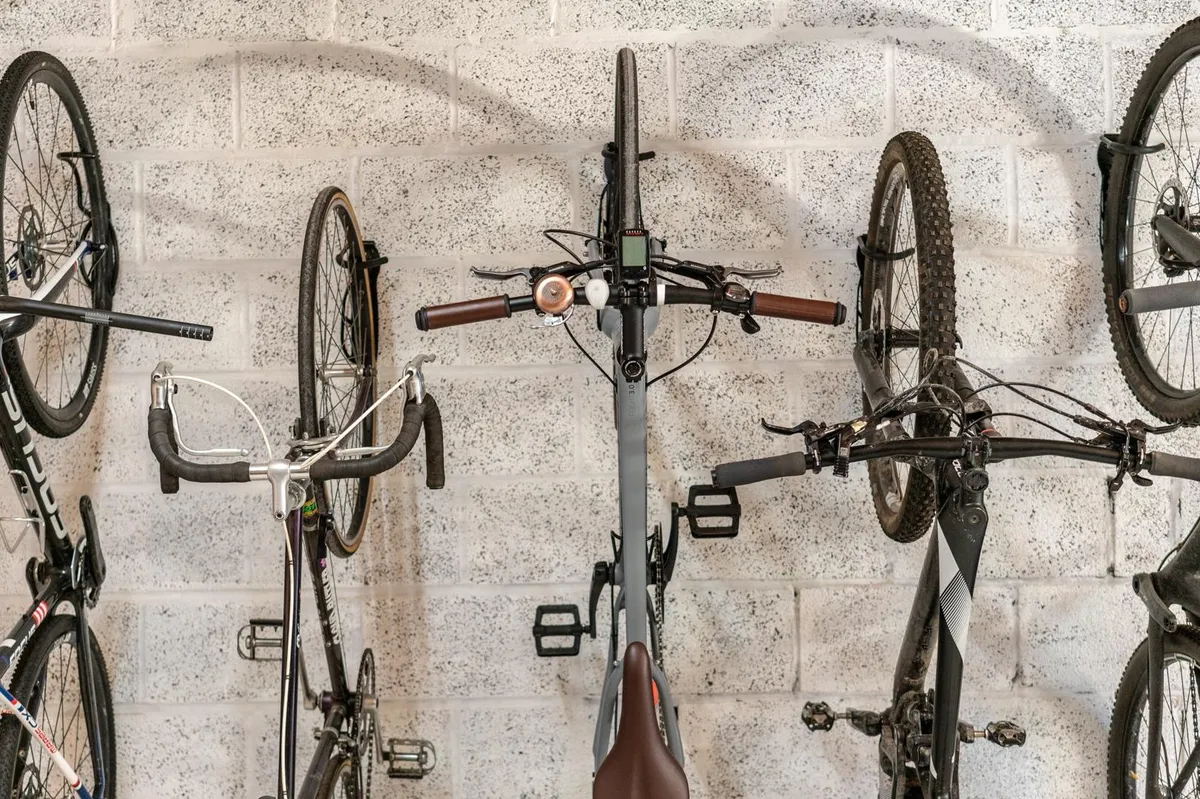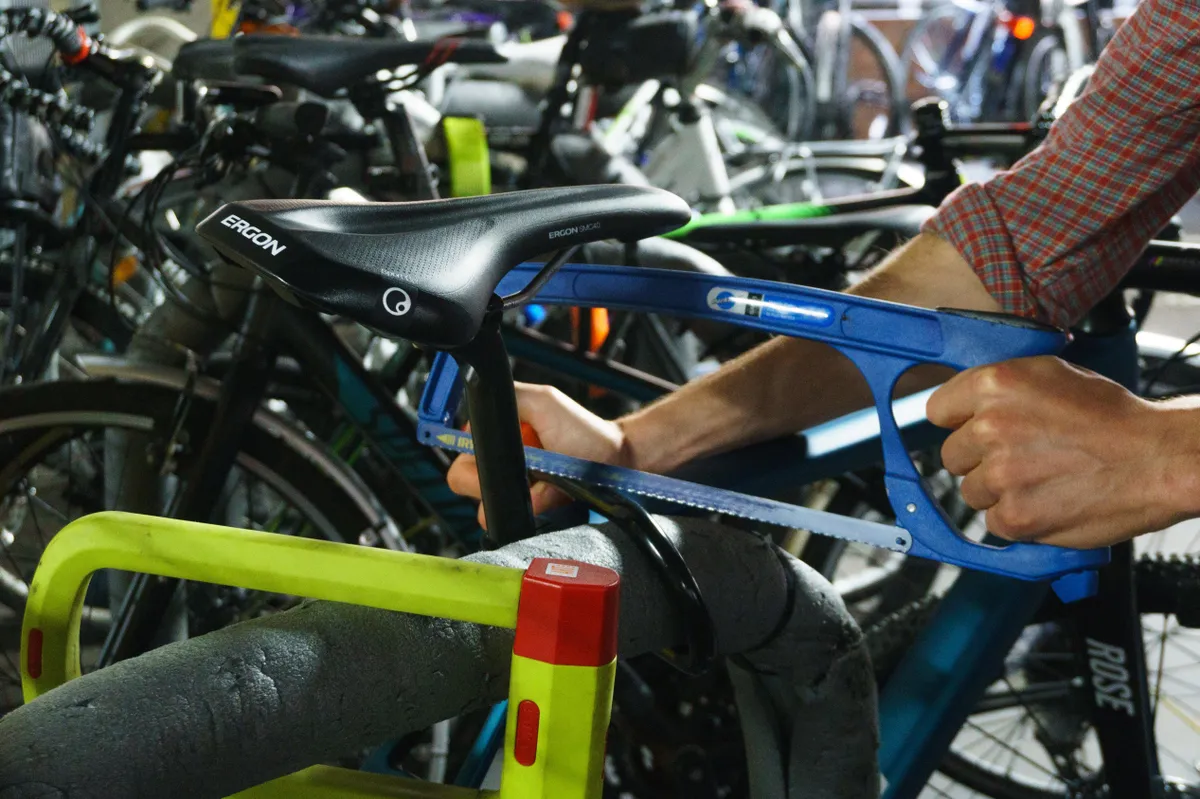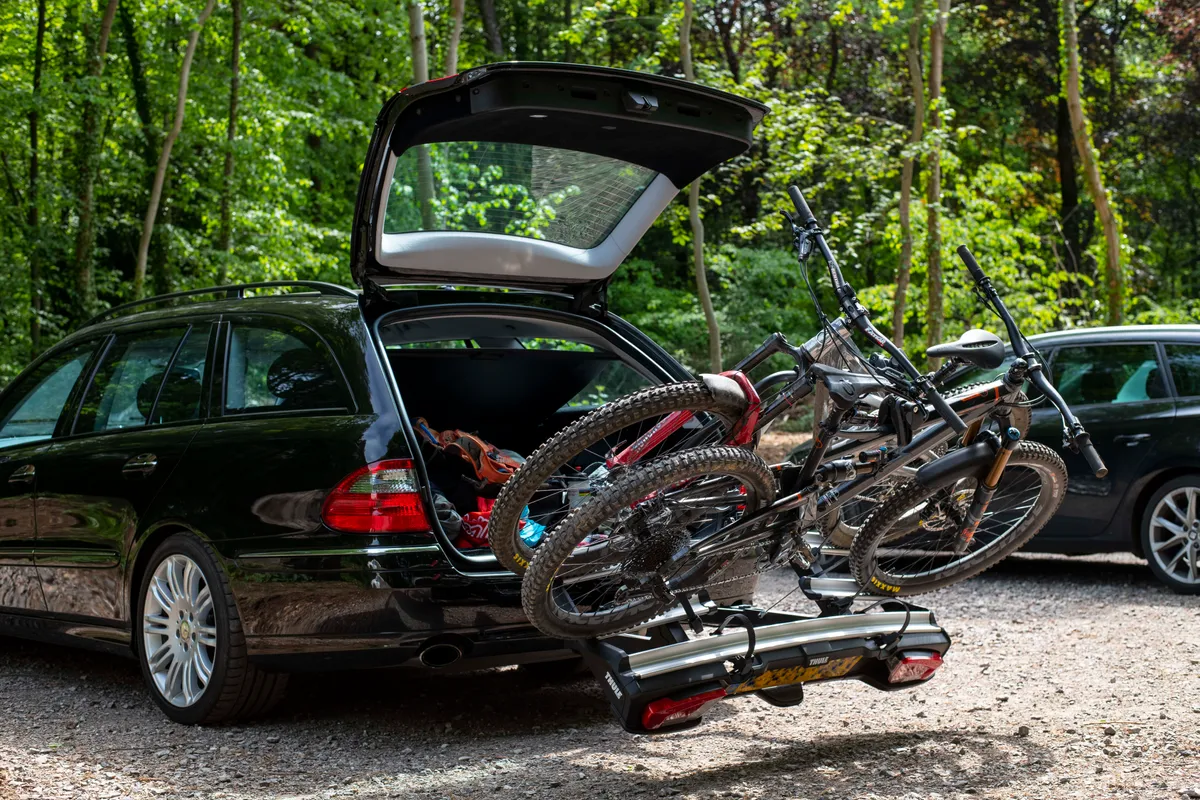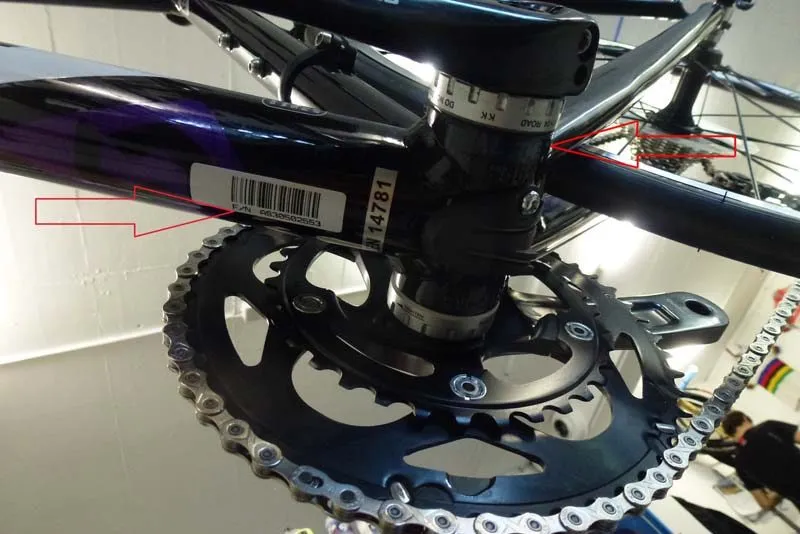Do cyclists need insurance? Do you need to be insured to ride a bike on the road? Can bike insurance protect you against theft?
In short, it's not a legal requirement, but it may be a good idea.
It’s well worth considering investing in insurance for bicycles if you want to cover your bike against theft and accidental damage, or if you travel and race lots and want to be covered for every eventuality.
This is the most comprehensive guide to choosing the best bicycle insurance on the web and will help you make an informed decision on the type of cover you may need.
If you're looking for a quick quote, check out the insurance comparison tool, developed in collaboration with QuoteZone, to get a cycling insurance quote in seconds.

In this guide, we'll walk you through the different options available for specialist bicycle insurance, based on the common key concerns that cycle owners have:
Editor's note: this guide was updated on 18 March 2025, to include some new tips to help you make sure you're covered by your insurance policy and include the latest crime and insurance statistics.
What are the different options for insuring a bicycle?
Bicycle insurance with your home contents insurance policy

Home insurance is, by far, the most popular way to insure bikes. According to a survey carried out by BikeRadar in April 2016, 75 per cent of those who insure their bike do so via their home insurance.
The appeal of doing so is obvious; including your bike under home insurance keeps everything neatly tied up into one package and is one less thing to think about when it comes to renewal.
If you are after a fuss-free policy that will cover you for the basics, or if you just want to insure a cheap bike, it can also represent good value for money.
However, there are disadvantages to insuring your bike on your home insurance compared to specialist cover, particularly for the dedicated cyclist.
Specialist bicycle insurance
Specialist insurance policies for bicycles are targeted towards more serious cyclists.
It’s possible to purchase insurance that will cover pretty much every eventuality imaginable, but for cyclists, these are the main areas that will be covered by specialist insurance that won't be by home insurance:
- Families and multi-bike households
- Kit damage during racing
- Lost race fees if unable to complete
- Additional bike accessories
- Cycle clothing
- Minor to major personal accident cover
- Public liability if you cause an injury to someone else
- Roadside assistance
We’ll kick things off by going through each of these and detailing what you should be aware of, and compare the advantages of specialist bicycle cover versus general insurance products.
What type of bicycle insurance cover do I need?
Bicycle theft insurance

When asked in a survey carried out by BikeRadar, the majority of respondents were primarily interested in bicycle theft insurance.
This is not without good reason. With 77,148 bikes stolen in the UK in 2022/23 (according to the Office for National Statistics), it’s clear that they’re a prime target for thieves. What's more, 90% of bike theft crimes go unsolved.
Bicycle theft insurance can help you recoup the cost of a new bike in the event it is stolen, with many insurers offering to replace your old bike for new.
It’s a competitive market and this means coverage is better than ever, and there are a lot of policies to choose from, so make sure you shop around.
While any provider will still expect you to undertake your due diligence, leaders in the market now pay out in up to 95 per cent of claims.
If you do want to insure your bike via your home insurance, the first thing to do is to check that it is actually covered under your policy.
Most policies will include basic bicycle cover under standard ‘personal belongings’ cover, but it’s likely to have a maximum claim that may not suit the value of your oh-so-precious bike, with some policies setting limits as low as £350.
Some providers will allow you to increase the maximum value of your personal belongings, but it’s best to speak to your provider directly to determine the level that you can set that limit. The best policies will go as high as £15,000.
This can add quite a lot to your premium, so shop around and make sure specialist cover – and all the associated benefits it brings – won’t work out cheaper.

Unless explicitly stated, most home insurance policies will also only cover a bike if it is stored indoors or properly secured in a garage or shed. The downsides of this are obvious for the cyclist who doesn’t ride solely on a turbo trainer and wants to take their bike outdoors.
However, a number of home insurance providers will allow you to extend coverage out of the home. For example, both M&S Bank and Hiscox insurance allow you to add ‘away from home’ coverage for a premium.
Be sure to pay close attention to the details here and make sure that your policy covers your bike when it is ‘in use’. Some insurers will only cover your bike for accidental damage or theft when it is stationary/being stored.
The same advice applies to specialist cover, but check the rules around storing your bike in a car, particularly overnight. Many home insurance policies specify that a bike must be stored out of sight or your cover is invalidated.
If you own more than one bike, it’s a good idea to shop around, because some insurers will offer generous discounts – sometimes as much as 60 per cent – on additional bikes.
A last word of warning: while it may seem obvious to an experienced cyclist, explaining to a home insurance provider that a bicycle could possibly be worth a sum of many thousands more than a car may be... challenging. A specialist provider is more likely to understand in such a situation.
Insuring a bicycle with renters/tenants insurance
If you don’t own your home and you don’t want to go down the specialist cover route, it’s also worth considering covering your bike with renters/tenants insurance.
All of the same guidance for home insurance applies here, so make sure you shop around and speak to your provider to find out about all of the nitty-gritty details. Pay particular attention if you live in shared accommodation because this can complicate matters.
Cycling event insurance

If racing is a big part of your life as a cyclist, it’s worth shopping around to see what cover may be useful to you.
Your entry fees to any well-run event will include third-party insurance. This will protect you and the organiser if you injure a spectator or damage property.
However, it is unlikely to cover personal injury, damage to your bike, or injury or damage to fellow competitors and their bikes.
Most specialist bike insurance providers will include the option to add dedicated event cover. Home insurance providers are very, very unlikely to offer this.
Depending on the provider you choose, most will also cover for accidental damage to your bike and kit that may occur during a race. Most will also cover you against theft from any transitions.
Some insurers will also often pay out if you get injured before an event and can’t attend, covering any loss of entry fees.
If you’re only planning on attending a few events in a year and don’t want to pay for a full year’s coverage, it’s worth looking into short-term coverage. Some providers will allow you to buy coverage for a week at a time.
Some policies will exclude mass start events, crits and extreme fringes of the sport (think trials riding, Megavalanche and the like), so make sure whatever you choose will work for you.
Accidental damage insurance

Despite theft being the biggest concern for most cyclists, accidental damage coverage makes up the biggest portion of claims for most specialist bicycle insurance providers.
Accidental damage cover will typically cover everything from replacing a whole bike down to individual components and accessories depending on the level of coverage you choose.
Bikmo revealed via its 2023 Open Project that 40% of claims involved replacing the bike and accessories, such as pedals, a GPS unit and a lock.
Home insurance may work out well for more expensive items such as GPS devices and the best road bike or mountain bike helmets, but specialist cover is normally a better option if you want comprehensive cover for all of your kit.
This isn’t quite as cut and dried as theft cover, so shop around and compare policies if you are a particularly accident-prone cyclist.
Cycling travel insurance

If you are planning a trip abroad with your bike, it’s worth investigating whether taking out insurance from a specialist provider is a better option than non-specialist travel insurance.
Non-specialist travel insurance policies may cover you if you happen to ride a bike while on holiday, but are unlikely to cover you if the trip is explicitly a cycling holiday. Such a policy will also almost certainly not cover mountain biking or any form of racing.
Most travel insurance policies will also not pay the costs of a hire bike if your bike is damaged in transit.
Specialist bike insurance policies are much more likely to cover such eventualities and are pretty much the only way to make sure you’re covered if you are racing.
If you’re going abroad to race in an ultra-endurance event, check the details of your plan because some include distance or duration limits.

Some home insurance policies that cover your bike against theft or damage when away from the home will also have limited cover when abroad.
Be sure to pay close attention to the terms of your policy, but pay particular attention to rules around theft and accidental damage when in transit.
Like racing insurance, most specialist providers will also offer short-term packages.
Membership of certain cycling clubs will also cover you for some trips abroad.
Personal accident insurance

Personal insurance will provide you with financial support should you be seriously injured on your bike.
Some policies will pay out a lump sum if you're unable to work due to your injuries and help cover medical costs including physiotherapy and dentistry work.
If you have any pre-existing medical conditions, make sure you declare these with your insurer because failure to do so may nullify any cover.
A dedicated personal insurance policy will offer a far more comprehensive level of coverage compared to a specialist bicycle insurance policy.
Even though it's not a legal requirement, most policies from either a dedicated personal insurance provider or specialist cycling insurance provider will also require you to wear a helmet at all times for your insurance to be valid.
However, as most products offer some level of personal insurance cover, it’s worth comparing what’s on offer because it may help make up your mind if you’re stuck between two policies.
Third-party cycle insurance
Third-party and liability insurance is a whole other kettle of fish.
If you have a serious collision and injure someone else, third-party insurance will cover you for damage to others and their property, and also cover you for legal costs.
With this in mind, it may well be time that you consider liability insurance to protect you in the event of a serious accident.
Obviously, if you are breaking the law (don't do that) when the accident is caused, insurers are unlikely to accept your claim.
Home insurance vs bike insurance
Should I buy specialist bicycle insurance or use my home insurance?
Specialist bicycle insurance may feel like yet another expense, but if you want the best possible chance of getting a payout in the event of a claim, it’s almost certainly your best bet.
It may seem ridiculous to mention it, but bear in mind that a cycling-specific insurer will also likely better understand, and perhaps be more sympathetic, to your potential claim than a home insurance provider.
The same can be said for when you’re trying to set up your policy – explaining to a home insurance representative that your bike could possibly cost more than anything else you own could be frustrating.
With that said, if you’re after basic cover against theft for a cheap bike and don’t plan on travelling abroad or racing, putting a bike on home insurance may offer better value for money.
Lastly, the same advice applies to all providers, but make sure you pay close attention to the small print – insurance wouldn’t be a very profitable industry if providers paid out in every circumstance, so make sure you’re not going to be caught out by any sneaky loopholes.
Club membership

You may not be aware, but membership of a club often includes insurance.
Exactly what level of coverage is on offer differs from club to club, but a good number include third-party and liability cover as a minimum.
British Cycling is the most well-known club that offers discounted coverage (which is now provided by Bikmo).
CyclingUK membership, which costs just £4 a month, gives riders up to £10m of worldwide third-party liability insurance cover (excluding Canada and the USA).
For those who partake in other outdoor pursuits, some alternative clubs will have insurance that may cover you.
The Austrian Alpine Club is a commonly referenced option. While it will never cover you to the same level as a dedicated bicycle insurance policy, depending on the circumstances, it may cover you if you are injured while riding abroad.
What information do I need to insure my bike?
It’s quite a simple process to get a bicycle insurance quote. To do so, you will be asked for your:
- Age
- Address
- The value of your bike
Other insurance providers will also ask you for:
- Bike make
- Model
- Bike type
- Serial number
- Whether it has custom parts of specifications
You will also probably have to declare if you're bike is an electric bike. Most policies cover ebikes, but there are also specialist electric bike insurance policies on the market.
How much does bike insurance cost?
You could pay less than £27 for bicycles valued up to £1,500.
Fifty one per cent of customers with a bicycle valued up to £1,500 who obtained a quote for bicycle insurance through this service provided by Seopa Ltd during August 2024 were quoted less than £27.06.
Using the same calculation for bicycles valued between £1,500 and £3,000 gave a figure of £50.34 and for bicycles valued over £3,000 gave a figure of £99.97.
*The quote price you could achieve is dependent on your individual circumstances.
Tips to make sure you’re covered
As we’ve already alluded to, insurers will expect you to do your due diligence, and failure to follow these tips could sting if you have to make a claim.
If all of this seems excessive and a hassle, we'd urge you to swallow the moderate inconvenience now – the stress of working with the police and making a claim to your insurers without thorough details will be far worse.
You must remember that paying out on a claim costs insurers money. Paying out on every claim would not be a very good business model, so proving that you have done your due diligence will make your life much easier. The police are also much more likely to take you seriously.
How to lock your bike

If locking your bike away from home, make sure you do so in a well-trafficked, bright and, ideally, CCTV-covered area.
This will not only make your bike less likely to be a target for thieves, but will also make your life easier should you have to make a claim.
We've got a full guide on how to lock a bike properly, to ensure you don't become a victim of theft.
Otherwise, it's worth noting some insurance providers supply a list of approved locks that must be used. To pick one example, Pedalsure requires that:
- Bikes valued up to £1,000 are secured with a minimum Sold Secure Bronze lock
- Bikes valued between £1,000 and £2,000 are secured with a Sold Secure Silver or Gold
- And bikes over £2,000 are secured with a Sold Secure Gold lock
In this particular case, using anything else would void your insurance. Sold Secure has a list of approved locks on its website.
Even if your policy doesn’t specify a particular model, you should still invest in a dependable and secure lock – read our buyer's guide to the best bike locks for more.
Lastly, make sure there are no clauses in the small print regarding the condition you leave your bike in when locking it up.
As BikeRadar reported way back in 2008, one insurer insisted that because a student had not removed their saddle and front wheel when their bike was stolen, their claim was voided.
As far as we can tell, there’s nothing like this these days, but it still can’t hurt to check.
Abandonment
Abandonment refers to a bike that has been left unattended when locked up away from your home for a set amount of time.
Some providers will define a bicycle as abandoned after as little as 12 hours, but most insurers define abandonment as 24 hours unattended.
If you leave your bike over this amount of time, you may not be covered, particularly against accidental damage or vandalism.
Leaving your bike in a vehicle

Another thing to check is if there are special conditions about leaving your bike in a locked car or van, or on a bike rack.
Some insurers will state that the bike must be out of sight (covering with a blanket in the back of a car is an easy way to deter opportunist thieves), and others will only pay out for claims where the bike was locked to an anchor inside the car itself or to the bike rack.
Why you should register your bike

It is good practice to register your bike with one of a number of popular services.
In the UK, Bike Register is the most popular and is the service used by the police when trying to identify a stolen bike.
Provided the bike has been registered via the scheme, a logbook will also be available online, meaning you’re able to check whether a second-hand bike is stolen.
Take photos
On a similar note, it’s also good practice to take regular clear photos of your bike, particularly if you make any upgrades from stock components.
It’s a good idea to photograph your bike’s frame number, which is normally but not always stamped underneath the bottom bracket shell of the frame. It can also play a critical part in getting your bike back to you should it end up stolen.
In our obsessively Instagram-documented world, this shouldn’t pose too much of an issue to most, but clear and accurate photos paired with receipts will make your life much easier should your bike be stolen.
Is your bike insured if someone else rides it?
Details differ from policy to policy, but most will cover you if an immediate family member uses your bike.
Conclusion
Now that you’re a seasoned insurance expert, you can make a reasoned judgment as to who is going to offer the right policy for you.
Luckily, we’ve done some of the heavy lifting for cyclists and, in conjunction with some of the industry’s leading providers in the UK, have put together a list of the best bike insurance on the market.
In the meantime, leave any of your thoughts and experiences, good or bad, in the comments. We’ll do our best to get back to your questions.

The information on this page is intended for editorial purposes only and not intended as a recommendation or financial advice.
BikeRadar is an Introducer Appointed Representative (IAR) of Seopa Ltd (FRN: 313860)
